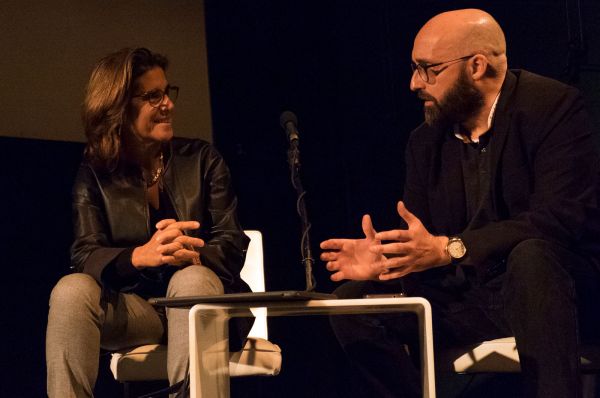FuturePlaces reaches its tenth edition
Interdisciplinary research,
education and capacity building
31 Oct 2017
The tenth edition of FuturePlaces happened between October 17 and 21 in Porto, and both celebrated the last decade and looked ahead into future possibilities
Professor Doreen Lorenzo opened the doctoral symposium with a lecture on knowledge and technology transfer through design, and Secretary of State for Science Fernanda Rollo closed the last day of FuturePlaces with a keynote-turned-think-tank on the need to devise strategies for literacy and new pedagogical paradigms.
 Between these two key events, FuturePlaces hosted two concerts in collaboration with Radio Manobras and the Doctoral Program in Digital Media, the traditional video game showcase, a beat poetry session, a new installation by Openfield, a retrospective of its poster design, two audio editions and a guided tour of U.S. Election memorabilia in partnership with MIRA Forum and Ephemera.
Between these two key events, FuturePlaces hosted two concerts in collaboration with Radio Manobras and the Doctoral Program in Digital Media, the traditional video game showcase, a beat poetry session, a new installation by Openfield, a retrospective of its poster design, two audio editions and a guided tour of U.S. Election memorabilia in partnership with MIRA Forum and Ephemera.
Of course, no FuturePlaces would be complete without the twelve Citizen Labs, which this year included analogue remixing, home-made cyborgs, learning the centenary craft of painting tiles, and multicultural ethnography. All converged in the Academy of Citizens, a marathon of presentation of outcomes where further developments are envisioned and put into practice.
A pioneering event in regards to the impact of media in the socio-cultural fabric, FuturePlaces reached its tenth edition having evolved from a Festival/showcase into an immersive Media Lab with a highly dedicated core team of curators, coordinators, and participants. This has happened along with the birth and consolidation of the doctoral programs in digital media and design, whose students have coordinated the bulk of the workshops in recent years.
In 2017, FuturePlaces has matured into a community of researchers committed to performing a critical and operative interpretation of the dynamics and benefits of new media, but also its risks and challenges. The discussion on the personal, social, cultural and political implications of technology could not be more timely. Meanwhile, the city of Porto itself has changed dramatically in the last decade, and now includes the most varied forms of social and cultural engagement, from mass entertainment to self-sustained projects and communities. We can only imagine what the next decade will look like.
One final note: the FuturePlaces team is interested in organising an exhibition/archive of physical outputs throughout the various editions. If you have participated and would like to donate or lend some of the work developed, please get in touch via futureplacesmedialab@gmail.com
Image: Secretary of State for Science Professor Fernanda Rollo and FuturePlaces curator Professor Heitor Alvelos at the closing remarks of FuturePlaces 2017. Photography: Luís Barbosa.

 News
News
